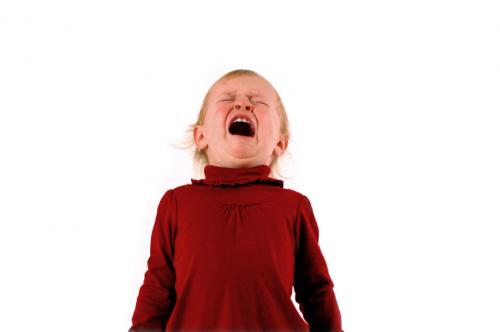How to handle an angry child with ADHD

Step #1
Understanding Attention Deficit Hyperactivity Disorder is a critical part of parenting or teaching a child with this disorder. ADHD, or ADD as it is often referred, is thought to be a neurological disorder that has been present from childhood and manifests itself through a variety of behaviors. These include hyperactivity, forgetfulness, poor impulse control, and distractibility. ADHD is thought to be a chronic syndrome—that is, one that can’t be cured—although it can be minimized and controlled. The question of how to treat ADHD is a constant source of discussion and debate in medical circles. Some advocate medication while others support behavior modification in order to minimize the symptoms. No clear-cut solution has presented itself, however, and the generally preferred mode of treatment is medication.
Step #2
If you look at how the core symptoms of ADHD can affect a child, it's easy to see how they’re linked to bad or aggressive behavior.
• Hyperactivity causes a child to fidget, run about excessively, talk excessively and have difficulty in playing quietly. It can cause a child to accidentally damage others' belongings, play too roughly and hurt other children.
• Impulsivity causes a child to blurt out answers, speak before thinking, interrupt, barge into games and have volatile moods. It can result in your child having a short fuse and to lash out when frustrated.
• Inattention causes poor attention to detail and problems with following instructions. A child with inattention problems may not appear to listen to requests.
Step #3
There are two parts to tackling any behavioral problem: encouraging the behavior you want through rewards, praise, or attention; and, reducing the behavior you don't want with clear, consistent rules and quick punishments.
Step #4
Children with ADHD thrive on consistency and routines, so to improve the chances of good behavior, let them keep to their routine, such as getting up, eating or leaving for school at the same time each day. The most effective way of enforcing rules is to decide on them together with your child, so agree in advance things such as bedtimes, how long friends can come over and play for, etc.
Step #5
There are some very effective ways to reduce bad behavior. Get your child's attention. Address him/her by name and speak clearly. Keep commands short and simple. Give quick punishments that can be enforced immediately. It's not always possible to ignore bad behavior and focus on the good. Instant mild punishments, sometimes called 'negative consequences,' can reduce aggressive and angry behavior.
Step #6
Bad behavior often decreases when it costs your child something. The three main costs are time, money and undesirable consequences such as briefly removing your child from an activity he/she enjoys. Punishments can take various forms.
• Natural consequences may be enough to stop the behavior. For example, if you throw your drink on the floor, you don't get another.
• Time-out can be helpful in dealing with tantrums. This is when your child has to sit out for a brief amount of time, usually about five minutes. For older children, a good rule of thumb is one minute for every year of age. The idea is to give your child a chance to calm down. An example would be to have your child to sit at the foot of the stairs or in a corner.
• Losing privileges such as allowance or games console can also discourage bad behavior. It's a good idea to limit these punishments to a set period—like one day, or one hour—so your child has a chance to start the next with a clean sheet.
Step #7
When your child has calmed down and returned to his or her normal self, talk to him or her and be clear about what was wrong and what you'd like to see changed. You may be tempted to ask 'why', but with younger children especially, it's best to keep any analysis to a minimum. Often tantrums and anger are your child's way of expressing things she can't put into words.
Step #8
Over the next few days after your child was disciplined, look out for signs that he or she has corrected their inappropriate actions. If they have, tell them you're pleased that they listened to you.

Tips
- There are social implications that accompany a disorder like ADHD. Consider that 21 percent of teens with ADHD skip school repeatedly, and 35 percent eventually drop out of school. ADHD children are also more likely to experiment with drugs and alcohol, and are more likely to get into accidents.
- Where possible, make sure you give your child a good reason for the behavior you want. For example, tidying up your room will mean you'll find things more easily.
- The main reasons why punishment fails are because it’s too severe, it’s given too late, or it’s inconsistent.
- Be careful not to reward bad behavior. For example, items you buy after a tantrum on a shopping trip could be seen as a reward.
- Keep consequences small and instant. It's consistency that's effective, not severity. Monitor the effect of the punishment given to a child who is misbehaving. If it isn't changing the behavior, it's time to try a different tack.

Warnings
- Medication can help ADHD, but you must modify other things such as environment schedule, and attitude in order to effectively deal with ADHD.
- Avoid punishments that have the potential to harm your child either physically or psychologically. For example, keep from insulting your child publicly.





